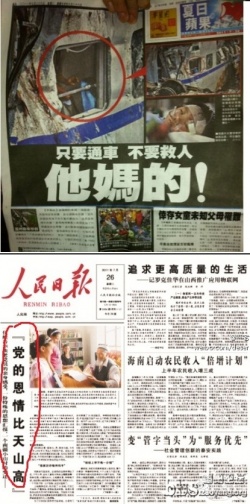“WTF”的版本间的差异
来自China Digital Space
| 第7行: | 第7行: | ||
A very notable use of the phrase appeared in the July 26, 2011 edition of Hong Kong’s Apple Daily newspaper shortly after the [http://chinadigitaltimes.net/china/high-speed-rail-crash/ Wenzhou train accident]. The front page headline read, “Clearing the Tracks, Not Saving Lives; WTF!” (只要通车不要救人 他妈的!) | A very notable use of the phrase appeared in the July 26, 2011 edition of Hong Kong’s Apple Daily newspaper shortly after the [http://chinadigitaltimes.net/china/high-speed-rail-crash/ Wenzhou train accident]. The front page headline read, “Clearing the Tracks, Not Saving Lives; WTF!” (只要通车不要救人 他妈的!) | ||
| − | + | [[Category:Grass-Mud Horse Lexicon]][[Category:Society and Culture]] | |
| − | |||
| − | |||
| − | |||
| − | |||
| − | [[Category: Grass-Mud Horse Lexicon]] | ||
2016年3月15日 (二) 15:53的版本
他妈的 (tāmāde): WTF
Swear word, literally “his mother’s.” Like “fuck,” the phrase has a sexual connotation, though it is less harsh than its English counterpart and has a broader range of uses. Like its English-language counterpart, it is versatile, changing its meaning depending on context. This term is often abbreviated WTF or TMD.
Lu Xun, the father of modern Chinese literature, once honored tamade as China’s “national swearword” [Chinese].
A very notable use of the phrase appeared in the July 26, 2011 edition of Hong Kong’s Apple Daily newspaper shortly after the Wenzhou train accident. The front page headline read, “Clearing the Tracks, Not Saving Lives; WTF!” (只要通车不要救人 他妈的!)





